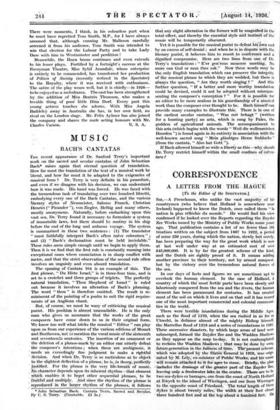MUSIC
BACH'S CANTATAS
Diu recent appearance of Dr. Sanford Terry's important work on the sacred and secular cantatas of John Sebastian Bach* raises again that eternal question of translation.
How far must the translation of the text of a musical e' . work b literal, and how far must it be adapted to the exigencies of musical form ? Dr. Terry is very definite in his procedure, and even if we disagree with his decision, we can understand how it was made. His hand was forced. He was faced with the tremendous task of translating over two hundred libretti, embodying every one of the Bach Cantatas, and the various literary styles of Neumeister, Salomo Franck, Christian Henrici (" Picander "), von Ziegler, Helbig and many others, mostly anonymous. Naturally, before embarking upon this vast sea, Dr. Terry found it necessary to formulate ,a system of immutable laws, lest there should be mutiny in his ship before the end of the long and arduous voyage. The system is summarized in these two sentences : (1) The translator " must faithfully interpret Bach's often naive coloratura " .; and (2) "Bath's. declamation must he held inviolable." These rules seem simple enough until we begin to apply them. Then it is we find that the first rule is constantly running into exceptional cases where enunciation is in sharp conflict with metre, and that the strict obiervation of the second rule often involves an ungainly and even absurd translation.
The opening of Cantata 104, is an example of this. The first phrase, " Du Hirte. Israel," is in three-four time, and is set to a crotchet and three groups of triplets. The perfectly natural translation, " Thou Shepherd of Israel " is ruled out because it involves an alteration of Bach's phrasing. The word " thou " is therefore omitted. The result is re- miniscent of the pointing of a psalm to suit the rigid require- ments of an Anglican chant.
. But, of course, we must be wary of criticizing the musical purist. His position is almost unassailable. He is the only man who gives us assurance that the works of the great composers have come down to us in their original form. We know too well what tricks the musical " Editor' can play upon us from our experience of the various editions of Mozart and Beethoven, not to mention the vocal music Of the sixteenth and seventeenth centuries. The insertion of an ornament or the deletion of a phrase-mark by an editor can utterly defeat the composer's intentions ; when these are ambigtious, it needs an exceedingly fine judgment to make a rightful ' decision. And when Dr. Terry is so meticulous as to objeCt to the slightest deflection of a phrase, he is, in theory, perfectly justified. For the phrase is the very life-breath of music. Its character depends upon its inherent rhythm—that element which enables it to beget other sequential phrases, to be fruitful and multiply. And since the rhythm of the phrase is reproduced in the larger rhythm of the phrases, it follows
,
John Sebastian Bach. Cantata Texts, Sacred and Secular. By C. S. Terry. (Constable. £3 3s.) that any slight alteration in the former Will be magnified in the total effect, and thereby the essential style and instinef of the- music will be temporarily obscured. • Yet it is possible for the musical purist to defeat his_,own end by an exePss of self-denial ; and when he is in dispute with the literary purist, it behoves him to resort, to -conference and a dignified compromise. Here are two lines from one of Dr. Terry's translations : " E'er gen'rous measure meeting; No more can God or man thee ask." Now these words may be the only English translation which can preserve the integrity of 'the musical phrase to which they are wedded, but there is alwaYs the question, " Are they worth singing ? " And this • further question, "If a better_ and more worthy translation- could be devised, could it not be adopted without misrepre- senting the composer's conception ? " For it is possible for an editor to be more zealims in his gdardianshin (Oa Musical work than the composer ever thought to be. Bach himself can provide many examples to illustrate this. There is in one of the earliest secular cantatas, " Was mir behagt " (written for a hunting party) an aria, which is sung by Piles, the goddess of agricultural animals. The accompaniment to this aria (which begins with the words " Weil die wollenreichea Heerden ") is found again in its entirety in association with the well-known sacred song " Mein gliiubiges Herze frohloeke " (from the cantata, "Also hat Gott."). ..
If Bach allowed himself so wide a liberty as this—why should Dr. Terry restrict himself within the small confines of io/cva- tura ? -


































 Previous page
Previous page